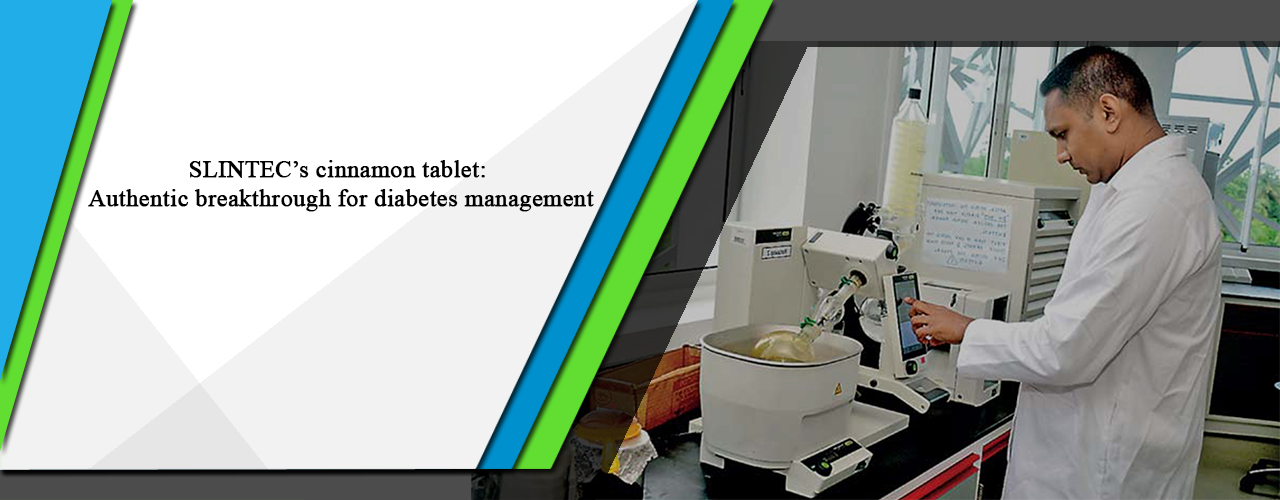SLINTEC’s cinnamon tablet: Authentic breakthrough for diabetes management
Daily FT: The Sri Lanka Institute of Nanotechnology (SLINTEC) located at the Nanotechnology and Science Park in Pitipana, Homagama, has developed a cinnamon tablet which is envisaged to be a ‘value-addition’ to the management of diabetes.
The sugar-controlling nutraceutical which has been formulated using cinnamon extracted from Ceylon Cinnamon bark is the first of its kind to be developed and is now awaiting clinical trials at the Department of Ayurveda.
Sri Lanka is a global hotspot for diabetes today, having the highest diabetes prevalence in South Asia. Diabetes is a growing cause of global mortality and morbidity and a driver of healthcare costs. Global studies by the NCD Risk Factor Collaboration (NCD-RisC) and the International Diabetes Federation (IDF) indicate that diabetes in low and middle-income countries is increasing faster than in high-income countries with age-standardised prevalence in most developing regions higher than high-income countries. About 422 million people worldwide according to WHO, have diabetes, the majority living in low-and middle-income countries, and 1.5 million deaths are directly attributed to diabetes each year. Diabetes is a major cause of blindness, kidney failure, heart attacks, stroke and lower limb amputation.
The research paper titled, ‘Prevalence of diabetes and pre-diabetes in Sri Lanka: a new global hotspot – estimates from the Sri Lanka Health and Ageing Survey 2018/2019’ published in the British Medical Journal (BMJ) in February this year notes that ‘the high prevalence in Sri Lanka may be due to it being the most affluent nation in South Asia with the highest rates of overweight and obesity.’ The study confirms that adult prevalence of diabetes was 23% in Sri Lanka in 2019, and pre-diabetes was 30%, significantly higher than previous estimates have suggested. It also notes that most of the increase in diabetes and pre-diabetes prevalence with BMI occurs in Sri Lankan adults of ‘normal weight’ as classified using WHO’s Asian BMI cut-offs.
The findings of the study suggest that the Asian BMI cut-offs are not adequate to capture the increased risk of diabetes in Sri Lankans and probably in other South Asians and underline the increased risk of diabetes in these populations at low body weights. Moreover, the findings ‘reinforce the need for increased re- search to understand the drivers of increased diabetes risk in South Asian populations and for increased efforts to tackle diabetes and underlying drivers such as weight gain in Sri Lanka.’
In such a backdrop, SLINTEC’s cinnamon tablet is perceived to be reducing the Metformin intake by diabetes patients. “Although the world is moving away from Metformin to new classes of diabetes management drugs such as Gliptins, many developing and underdeveloped countries still depend on Metformin as it’s economical in price and is effective. Here at home, 90% of people take 500 mg of Metformin thrice a day. In this context we were thinking of coming up with a solution using something inherent to Sri Lanka which could reduce the Metformin intake and the result is the cinnamon pill which entails the healing properties of Ceylon Cinnamon,” says SLINTEC CEO and the Presidential Advisor on Scientific Affairs Dr. Vajera Perera.
He goes on to note that the product, however, is not a total solution for diabetes but adds value to the management of the disease which comes at an enormous health, social and economic cost. The testing of the product which has been carried out on a rat-model has proven to be lowering the sugar levels in the body.
OSL take:
Sri Lanka’s health industry, especially pharmaceutical manufacturing, is an emerging business/investment opportunity in the country. The government of Sri Lanka has already announced many incentives to pharmaceutical manufacturers and allocate a pharmaceutical manufacturing zone in the country as well. Apart from Sri Lanka’s expanding health sector that has a constant demand for pharmaceuticals, Sri Lanka also presents an ideal venue to set up pharmaceutical manufacturing plants that could focus on medicinal exports. Sri Lanka’s geographical positioning in the Indian Ocean and the many trade agreements as well as trade concessions enjoyed by the country could further boost businesses looking at pharmaceutical exports from Sri Lanka. Given the business friendly environment, the country’s geographical positioning and the incentives provided, foreign businesses/investors could look at the growing opportunities in Sri Lanka’s health sector. They could also look at forming partnerships or joint ventures with local businesses.
| Article Code : | VBS/AT/20230616/Z_2 |

